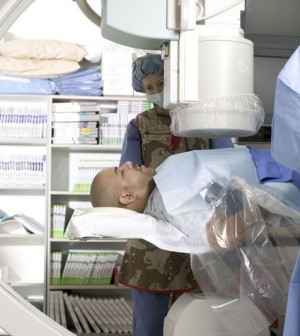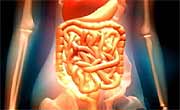- Double Mastectomy May Offer No Survival Benefit to Women With Breast Cancer
- Toxic Lead Found in Cinnamon Product, FDA Says
- Certain Abbott Blood Sugar Monitors May Give Incorrect Readings
- Athletes Can Expect High Ozone, Pollen Counts for Paris Olympics
- Fake Oxycontin Pills Widespread and Potentially Deadly: Report
- Shingles Vaccine Could Lower Dementia Risk
- Your Odds for Accidental Gun Death Rise Greatly in Certain States
- Kids From Poorer Families Less Likely to Survive Cancer
- Tough Workouts Won’t Trigger Cardiac Arrest in Folks With Long QT Syndrome
- At-Home Colon Cancer Test Can Save Lives
Ways to Cut Your Colon Cancer Risk


Colorectal cancer is the second leading cause of cancer death, but there are ways of reducing your risk.
“Colorectal cancer is largely preventable with early screening and detection,” Dr. Anne Lin, assistant professor of general surgery for the University of California, Los Angeles, Health System and David Geffen School of Medicine, said in a UCLA news release.
Taking the following measures can help you lower your risk of developing colorectal cancer, according to UCLA experts.
If you have a normal level of risk, you should get regular screenings beginning at age 50. If you’re at high risk — with a personal or family history of colorectal cancer, other cancers or inflammatory bowel disease — you should talk to your doctor about beginning screenings before age 50.
Every day, eat 25 to 30 grams of fiber from fruits, vegetables, nuts, beans or whole-grain breads and cereals. It’s also important to eat a low-fat diet, because colorectal cancer has been linked to diets high in saturated fat. You should also include foods with folate, such as leafy green vegetables.
If you drink alcohol, do so in moderation. If you’re a smoker, quit. The combination of drinking and smoking is associated with colorectal and other gastrointestinal cancers, according to the news release.
Get at least 20 minutes of exercise three or four days a week. Moderate activities such as walking, climbing stairs or gardening may reduce your risk of colorectal cancer.
A healthy weight is important because obesity might boost the risk of colorectal cancer.
Tell your doctor about symptoms such as a change in bowel habits, blood in the stool, abdominal pain, weight loss or narrower-than-usual stools.
More information
The U.S. National Cancer Institute has more about colorectal cancer prevention.
Source: HealthDay
Copyright © 2024 HealthDay. All rights reserved.










